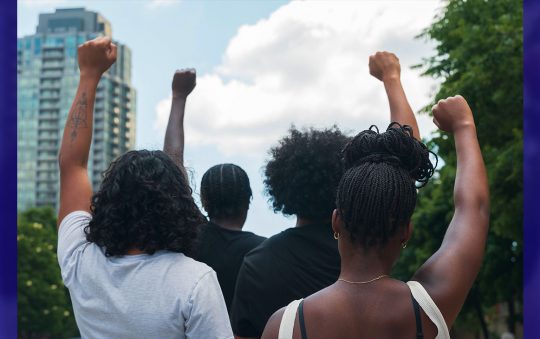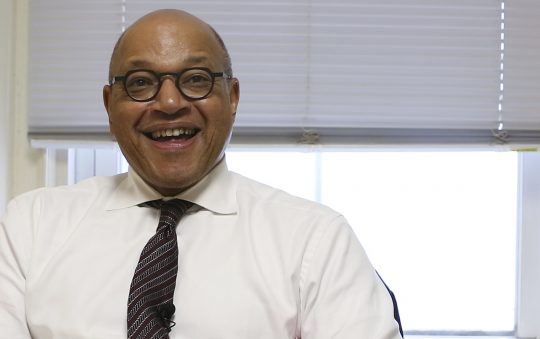
Talking about Black unity has fallen out of favor, but the need for unity is as great, if not greater, than ever. Black unity is a perquisite for sustainable change, but it has become a dust-covered relic. Bastardized remnants remain, but are found mostly in venues that do not advance our collective interest. Blacks continue to emulate Whites’ individualistic and materialistic values without commensurate benefits. Nonetheless, unity is essential for effectively working with each other and others.
Discussions about ideology and philosophy are increasingly rare among Blacks these days. However, during the 1960s, two of America’s foremost Black leaders, Dr. Martin Luther King Jr. and Minister Malcolm X came from two distinctly different religions and philosophical orientations, but both contributed greatly to Blacks’ struggle for freedom and justice. Nationalism identified more with Malcolm than with King; it was, and remains a key concept in the ongoing struggle for success, freedom and survival. Fundamentally, it is a call for group unity and solidarity.
The consciousness, motivation and activism that fueled the civil rights movement are also increasingly rare, but sorely still needed. Back then, it was not necessary to define the common purpose—it was a given-freedom and justice. Now, in addition to an absence of commonality around key issues, class too has increasingly become a divisive factor in Black America. The middle class tends to turn their backs on poorer Blacks, even though both remain targets of racism and discrimination. And they (middle class) are also conspicuously absent in efforts to improve conditions in the inner cities like failing schools, substandard housing, poverty, and police brutality. The middle class Blacks tends to rationalize that these things no longer affect them. Of course, poor Blacks, heavily concentrated in the nation’s inner cities, are least equipped to challenge the prevailing power structure. But they are further disadvantaged now because the middle class has effectively opted out of the struggle for justice, freedom and equity. The fact is, real sustainable change requires the on-going active participation of individual Blacks, regardless of socio-economic status.
Professor Ron Daniels points out that there was always a tension between those who preferred integration into the American body politic as the primary goal of the Black freedom struggle and nationalists who see integration as only one possibility in the quest for self-determination. The latter group has always advocated maintaining unapologetically Black institutions as integral for achieving full freedom and justice. Malcolm was the most influential proponent of Black Nationalism in the latter part of the 20thcentury. He strongly influenced the leaders of Black consciousness, Black power and Pan-African movements that challenged the integrationists’ faction during Black civil rights struggles in the 1960s.
In Malcolm’s words, “The political philosophy of Black nationalism means that Blacks should control the politics and politicians in their own community….We should control the economy of our community……Its social philosophy only means that we have to get together and remove the evils, vices, alcoholism, drug addiction and other evils that are destroying the moral fabric of our community.” (The Ballot or the Bullet 1964) He also said the purpose of racial solidarity is to build internal capacity for self-development to enhance the social, economic and political well-being of Black people. Malcolm’s remarks are as relevant today as they were 60 years ago, which unfortunately, is still a telling commentary on the snail-like pace of Black progress in the 21stcentury.
Daniels reminds us that the call for Black empowerment also generated a renewed interest in reconnecting with African roots and working for Pan-Africanism, i.e., the global solidarity of African people everywhere. He notes that Black nationalism also led to the formation of Black caucuses in Black and non-Black organizations, e.g., Congressional Black Caucus, Coalition of Black Trade Unionists, Associations of Black Psychologists, teachers, engineers, etc.
It is essential to reaffirm racial consciousness and solidarity as a means of securing Black interests. It is also important to debunk the hypothetical and diversionary “post-racial” rhetoric following Barack Obama’s election and continuing in a lesser fashion today. Blacks themselves must address ongoing disparities among themselves and between them, Whites and other groups particularly in the areas of employment, education, housing, income and health—all of these are persistent indicators of barriers to controlling our own destiny. Talk of race-neutral, color-blind public policy mocks and minimizes the depth of problems that still plague Blacks in this country and we must take strategic action to eradicate these barriers in order to achieve full freedom and equality. Again, this requires unity that has been lacking among Blacks- Black leadership especially- in recent decades.
Empowerment is the capacity to chart one’s own destiny. For Blacks, this means demonstrating unaccustomed and unapologetic unity that must again become as entrenched as the race-based barriers that we continue to face every-day of our lives.






